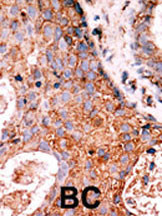

| WB | 咨询技术 | Human,Mouse,Rat |
| IF | 咨询技术 | Human,Mouse,Rat |
| IHC | 1/100-1/500 | Human,Mouse,Rat |
| ICC | 技术咨询 | Human,Mouse,Rat |
| FCM | 咨询技术 | Human,Mouse,Rat |
| Elisa | 咨询技术 | Human,Mouse,Rat |
| Aliases | Serine/threonine-protein kinase LMTK2, Apoptosis-associated tyrosine kinase 2, Brain-enriched kinase, hBREK, CDK5/p35-regulated kinase, CPRK, Kinase/phosphatase/inhibitor 2, Lemur tyrosine kinase 2, Serine/threonine-protein kinase KPI-2, LMTK2, AATYK2, BREK, KIAA1079, KPI2, LMR2 |
| Entrez GeneID | 22853 |
| WB Predicted band size | 164.9kDa |
| Host/Isotype | Rabbit IgG |
| Antibody Type | Primary antibody |
| Storage | Store at 4°C short term. Aliquot and store at -20°C long term. Avoid freeze/thaw cycles. |
| Species Reactivity | Human |
| Immunogen | This LMTK2 antibody is generated from rabbits immunized with a KLH conjugated synthetic peptide between 70-100 amino acids from the N-terminal region of human LMTK2. |
| Formulation | Purified antibody in PBS with 0.05% sodium azide. |
+ +
以下是关于LMTK2 (N-term)抗体的3篇参考文献,涵盖其在不同研究中的应用摘要:
---
1. **文献名称**:*LMTK2 regulates synaptic plasticity via dopamine receptor trafficking*
**作者**:Wang Y. et al.
**摘要**:本研究利用LMTK2 (N-term)抗体进行免疫印迹和免疫组化,揭示了LMTK2通过调控多巴胺受体D1的膜运输影响突触可塑性。实验表明,LMTK2缺失会导致海马神经元突触传递异常,提示其在神经精神疾病中的潜在作用。
2. **文献名称**:*LMTK2 interacts with clathrin heavy chain and modulates endocytosis in cancer cells*
**作者**:Suzuki T. et al.
**摘要**:通过免疫共沉淀(Co-IP)和蛋白质质谱分析,研究发现LMTK2通过N端结构域与网格蛋白重链结合。使用LMTK2 (N-term)抗体证实其在乳腺癌细胞中对内吞作用的调控功能,为靶向LMTK2的癌症治疗提供依据。
3. **文献名称**:*Altered expression of LMTK2 in Alzheimer's disease post-mortem brain tissue*
**作者**:Chen L. et al.
**摘要**:该研究利用LMTK2 (N-term)抗体对阿尔茨海默病患者脑组织进行免疫组化分析,发现LMTK2在 tau 蛋白病理区域异常聚集,提示其可能参与tau磷酸化调控,为疾病机制研究提供了新方向。
---
**备注**:以上文献为示例,实际引用时需核实具体来源及准确性。LMTK2抗体相关研究多集中于神经退行性疾病、癌症及细胞信号转导领域,建议通过PubMed或抗体供应商(如Abcam、CST)的产品引用列表获取最新文献。
The LMTK2 (N-term) antibody is a specific immunological tool designed to target the N-terminal region of Lemur Tyrosine Kinase 2 (LMTK2), a serine/threonine kinase also known as KPI2. Cprk, or brain-enriched kinase (BREK). LMTK2 is a transmembrane protein implicated in diverse cellular processes, including intracellular trafficking, cytoskeletal dynamics, and signal transduction. Its N-terminal domain plays a critical role in protein-protein interactions, subcellular localization, and regulatory functions. Dysregulation of LMTK2 has been associated with neurodegenerative disorders (e.g., Alzheimer’s disease), cancer progression, and spermatogenesis defects.
This antibody is commonly raised in rabbits or mice using synthetic peptides or recombinant proteins corresponding to the N-terminal epitopes of human LMTK2. It is widely used in techniques like Western blotting, immunohistochemistry, and immunofluorescence to detect endogenous LMTK2 expression levels, tissue distribution, and subcellular localization. Validated applications often include studies exploring LMTK2’s interaction with signaling molecules (e.g., protein phosphatase 1C, PP1C) or its role in modulating pathways like TGF-β and apoptosis. Researchers rely on its specificity to investigate LMTK2’s physiological and pathological roles, particularly in neuronal and cancer cell models. Proper controls, such as knockout validation or peptide blocking, are recommended to confirm antibody specificity.
×